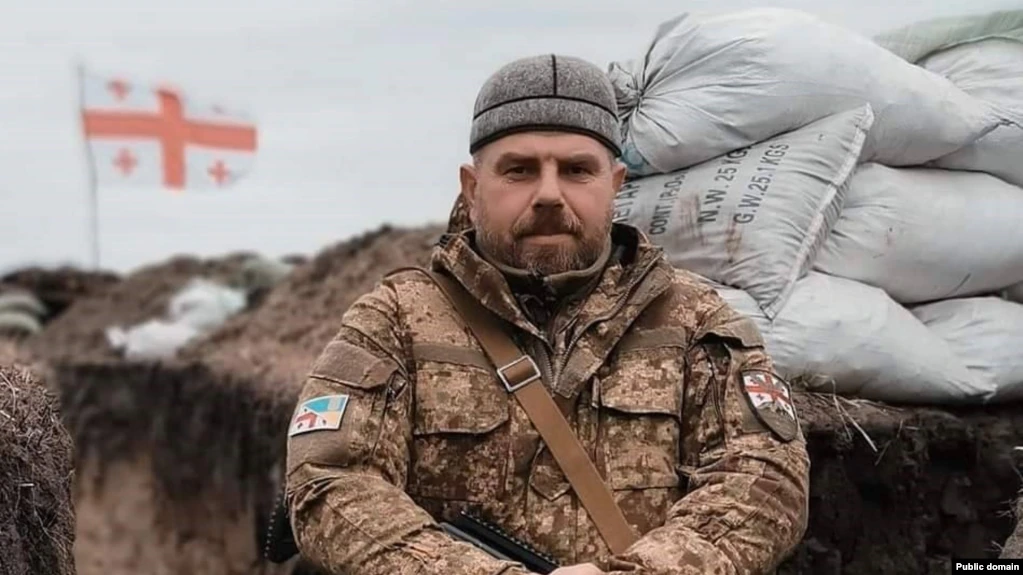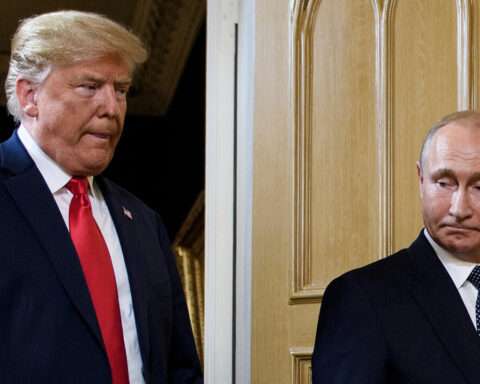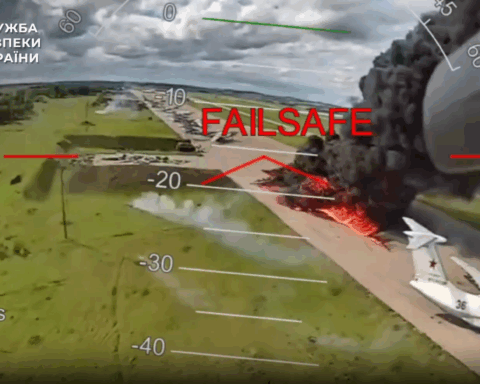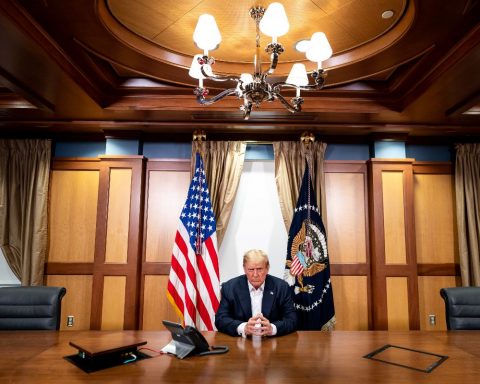Georgian Vadim Chkhetiani lies in a hospital bed in Ukraine, recovering from a serious wound suffered there in September while fighting with his countrymen, other foreigners, and Ukrainians against invading Russian forces.
“There is this village called Yampil…. We were attacked by the occupiers. A shell exploded and shrapnel hit my head. I was taken to the hospital and my wound was stitched up and I returned to the front line,” Chkhetiani recently told RFE/RL’s Georgian Service, referring to a village in the eastern Donetsk region of Ukraine.
His return to the battlefield was cut short, he said, when his health suddenly deteriorated, forcing him to “undergo rehabilitation” in a hospital, where his recuperation continues.
Chkhetiani, 45, is a member of the Armed Forces of Ukraine, a soldier serving in a unit of the 128th Mountain Assault Brigade.
Hundreds of ethnic Georgians are believed to be fighting in Ukraine with Kyiv’s forces, most notably with the Georgian Legion, a force of fighters that has been active for years in Ukraine and comprises not only ethnic Georgians but other foreigners, as well.
The Georgian Legion was formed in 2014 after Russia began fomenting unrest in the eastern, industrial Donbas region, shortly after the Kremlin illegally annexed Crimea. The Georgia Legion was ultimately integrated into the Armed Forces of Ukraine.
The force is said to number from 800-1,000, roughly evenly split between ethnic Georgians and a mixture of other nationalities.

The Georgian Legion has suffered several losses recently around Bakhmut, a town in the eastern Donetsk region that has been pummeled by Russia’s military in recent weeks.
Shortly after Russian President Vladimir Putin ordered the full Russian invasion of Ukraine on February 24, Ukrainian President Volodymyr Zelenskiy issued an appeal for foreigners to take up arms to defend his country. The authorities in Kyiv set up a website to ease the process.
Thousands of volunteers from dozens of countries were said to have responded, Ukraine said, although some have cast doubts on those figures.
While exact numbers of foreign fighters in Ukraine may be elusive, casualty figures appear firmer. One tabulation shows that Georgians, whose country’s population is only some 3.7 million, were dying in greater numbers than any other nationality.

In one of the latest as well as deadliest incidents, five Georgians were reported killed in action in early December near Bakhmut, a city in the eastern Donbas region.
Bakhmut, with a population of 80,000 people before Russia invaded in February, has become a symbol of the grinding warfare playing out along much of the eastern front, where enemy positions have rarely budged more than a few hundred meters in recent weeks.
Military experts say Bakhmut appears to be of little strategic value, but Russian forces, including mercenaries fighting for the Vagner group, have in recent days intensified their bombardment.
“Georgian volunteers died surrounded near Bakhmut. They were guys from Georgia who fought for Ukraine as part of the volunteer battalion Carpathian Sich (a historical reference to areas under control by the Cossacks.) The guys were surrounded. They refused to surrender to the invaders. The Russians hit them with heavy artillery fire,” explained Mamuka Mamulashvili, the founder and commander of the Georgian Legion.
“During the war in Ukraine, 33 volunteers from Georgia have already died. Georgia has sacrificed many lives to support Ukraine,” Mamulashvili told Georgian media on December 5.

That number went up to 35 on December 15, when RFE/RL’s Georgian Service reported that two more Georgian fighters were killed. One of the soldiers was named as Sergo Lisikh, who died on December 13.
“A journalist called me yesterday and asked me, ‘Do you know anything about Sergo?’ I had no idea what was going on. I had written to Sergo 22 hours before. The last thing he wrote to me was that he was fine and was entering the battlefield and had to cut off contact. That was our last communication. Since then, he has not seen my messages,” his close friend, Zaza Aduashvili, told RFE/RL on December 14.
Despite the dangers and the recent uptick in casualties in the Georgian Legion, Chkhetiani said his decision to join Ukraine’s army was the right one.
“What convinced me was that this war is not only for Ukraine, or even Georgia, but for the whole world. Our two countries — our small country and Ukraine, which is a lot bigger — have a common enemy,” he said.

For Chkhetiani and many other Georgians, Russia’s war against Ukraine rekindles bitter memories of Moscow’s invasion of their own country in 2008. On August 8 of that year, Russian forces launched the start of Europe’s first 21st-century war.
Russia poured troops in, ousting Georgian forces from the disputed territories of South Ossetia and Abkhazia, displacing more than 190,000 people. Now, Moscow recognizes both as independent states and maintains a major military presence in both regions. Most countries do not recognize South Ossetia and Abkhazia as independent but as part of Georgia.
Chkhetiani fought in the 2008 war, just one chapter in his rich military background. He also took part in peacekeeping operations in Afghanistan as a member of the NATO-led International Security Assistance Force (ISAF), as have other Georgians fighting in Ukraine.
He joined the Ukrainian Army in 2018 and says he saw a lot of battlefield action until being sidelined due to injury.
More than 20,000 volunteers from 52 countries were said in the early days of the invasion to have answered Kyiv’s call to come and fight, Ukrainian officials said.
However, how many have actually picked up a gun to fight is unclear.
Ukrainian presidential adviser Oleksiy Arestovych said in July that around 1,000 pro-Ukrainian foreign fighters had taken part in battles.
Fighters from Eastern Europe and former Soviet republics still seem to “constitute the bulk of arrivals, with Poland, Georgia, Belarus, Latvia, Lithuania, and Romania among the most frequently mentioned in open sources as countries of origin,” Russia Matters noted in August.
Chkhetiani says many nationalities are represented in his unit, but that doesn’t seem to matter.
“There is no difference between us. There is a difference in salary depending on the rank or position, but we are all paid. In our battalion, we are mostly Georgians, but there are local Hungarians and also [Roma], but everyone serves, and everyone gets paid. It doesn’t matter if you are Ukrainian, Georgian, or of any other nationality,” Chkhetiani said.
The loss of one comrade with whom Chkhetiani had bonded closely was especially painful.
“He died in March, and they couldn’t bring his body out. He was more than a friend to me, but like a member of my family,” Chkhetiani said. “You know how it is, you sleep in the same bunker, in the same corner, break bread together…. There is no greater friendship than this.”
Besides wishing a quick end to the war and victory for Ukraine, Chkhetiani hopes that his comrades “come back healthy and alive.”
“Because the situation at the moment is such that I don’t know…. It’s not clear whether they are safe or not,” Chkhetiani said. “I want them all to return to their families, healthy and happy.”






